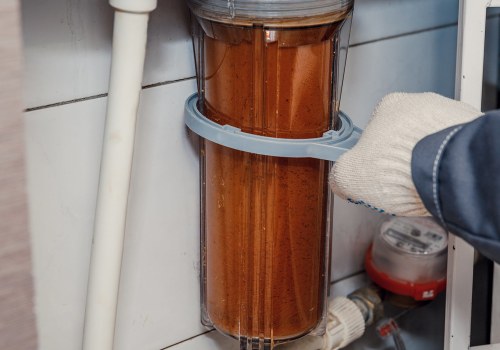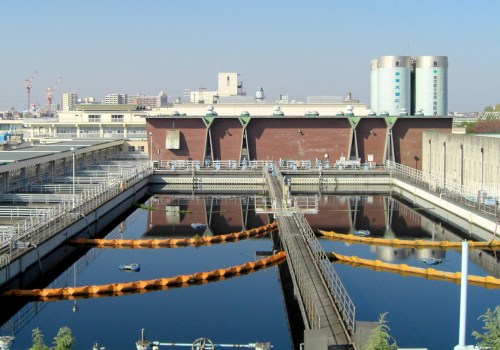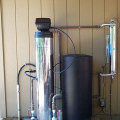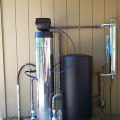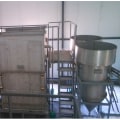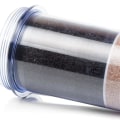Navigating Water Filter Certification: Ensuring Quality and Performance
Are you tired of playing a game of chance every time you sip from your water glass? Worried that your current water filter may not be up to par? Look no further!
This article will delve into the intricate world of water filter certification and standards, ensuring you have all the knowledge needed to make an informed decision.
From understanding different types of filters to evaluating their performance, we've got you covered in your quest for clean and safe drinking water.
So let's dive right in and separate fact from fiction!
Key Takeaways
• Water filter certification and standards, such as NSF/ANSI 53 and NSF/ANSI 42, are essential when choosing a water filter.
• These certifications ensure the quality and performance of the filter in removing specific contaminants and improving water safety.
• Different filtration technologies, such as activated carbon, reverse osmosis, and UV disinfection, may have varying certifications and standards.
• When deciding, it is crucial to compare different filters based on their certifications, standards, and the specific contaminants they are designed to remove.
Importance of Clean and Safe Drinking Water
Clean and safe drinking water is crucial for maintaining good health and well-being. Understanding the importance of water conservation and the health benefits of drinking pure Water is essential.
Water conservation plays a vital role in preserving our planet's resources. By reducing our water consumption, we can help protect the environment and ensure that future generations have access to clean Water.
Drinking clean Water has numerous health benefits as well. It helps hydrate our bodies, regulate temperature, lubricate joints, and aid digestion. Clean Water also eliminates harmful contaminants that can lead to diarrhea, cholera, or hepatitis.
Ensuring access to clean and safe drinking water is a fundamental human right and a necessity for maintaining optimal health and well-being.
Different Types of Water Filters
One popular option for water filtration is the activated carbon filter. This type of filter effectively removes impurities from Water by adsorption, where contaminants are trapped on the surface of the carbon particles.
When considering different types of water filters, there are several factors to consider:
• Filtration capacity: The amount of Water that can be filtered before the filter needs to be replaced.
• Micron rating: The size of particles that can be filtered out. A lower micron rating indicates better filtration.
• Filter lifespan: How long the filter will last before needing replacement.
• Maintenance requirements: Some filters require regular cleaning or replacement parts.
• Cost: Consider both the initial cost and ongoing expenses.
Understanding Water Filter Certification
When it comes to ensuring the quality and performance of water filters, understanding the various certifications and standards is crucial. Three key points to consider are:
• NSF Certification: This certification provides a technical and analytical framework for evaluating the effectiveness of water filters in removing contaminants and meeting safety requirements.
• WQA Certification: Similar to NSF Certification, WQA Certification also evaluates the effectiveness of water filters in removing contaminants and meeting safety requirements.
• EPA Standards: These standards set by the Environmental Protection Agency establish water quality and safety guidelines. Water filters that meet EPA Standards are considered reliable in removing contaminants and ensuring safe drinking water.
These certifications and standards play a significant role in evaluating the effectiveness of water filters in removing contaminants and meeting safety requirements. They give consumers confidence in the quality and performance of their chosen filters.
NSF Certification
The NSF certification ensures that water filters meet rigorous standards for quality and performance. Regarding water filter testing, the NSF sets the bar high. Their certification process comprehensively evaluates a filter's ability to remove contaminants from Water effectively.
This includes testing for flow rate, pressure drop, and capacity parameters. The filters undergo rigorous laboratory testing to handle real-world conditions and deliver consistent results.
The NSF certification also verifies that the materials used in the filter construction are safe and do not leach harmful substances into the filtered Water.
WQA Certification
By choosing a WQA-certified water filter, you can be confident that it has undergone a rigorous testing and meets industry standards for quality and performance. The WQA certification provides several benefits to both manufacturers and consumers:
1. Assurance of quality: The WQA certification ensures that qualified professionals have independently tested the water filter and has met the organization's stringent criteria for effectiveness, safety, and reliability.
2. Consumer confidence: When purchasing a WQA-certified water filter, consumers can have peace of mind knowing that the product has been thoroughly evaluated and will deliver the expected level of performance in removing contaminants from their drinking water.
3. Transparency and accountability: The WQA certification process involves regular audits and ongoing monitoring of certified products to maintain compliance with established standards. This helps foster trust between manufacturers, regulators, retailers, and consumers.
Understanding the WQA certification benefits and process empowers you to make informed decisions when selecting a water filter that meets your clean and safe drinking water needs.
EPA Standards
The EPA sets guidelines for the safety and effectiveness of water filters. Under these regulations, water filter testing ensures the devices meet specific standards. The testing process involves subjecting the filters to various conditions and measuring their performance against predetermined criteria. Factors like flow rate, capacity, and overall efficiency are evaluated. Water filters are tested for their ability to remove contaminants such as bacteria, lead, chlorine, and other harmful substances from drinking Water. By adhering to EPA regulations, manufacturers can provide consumers with reliable information about the quality and performance of their water filters. This allows individuals to make informed decisions when selecting a filter that best suits their needs and ensures clean, safe drinking water in their homes or businesses.
Evaluating Filter Performance
When evaluating filter performance, there are three key points: flow rate, contaminant removal, and filter lifespan.
The flow rate refers to how quickly Water passes through the filter, which can impact efficiency.
Contaminant removal measures the filter's effectiveness in removing harmful substances from the Water.
Filter lifespan determines how long the filter will last before needing to be replaced.
Considering these factors is crucial in determining a water filter's overall performance and suitability for your needs.
Flow Rate
To determine the flow rate of a water filter, you can measure how much water it delivers per minute. Flow rate refers to the amount of Water that can pass through the filter in a given period. It is an essential factor to consider when evaluating the performance and efficiency of a water filter.
A higher flow rate means more Water can be filtered in a shorter time, which is especially beneficial for households with high water usage. However, it's crucial to balance flow rate and filter efficiency.
While a high-flow filter may deliver more Water quickly, it may compromise its ability to remove contaminants from the Water effectively. Therefore, choosing a water filter that offers both an adequate flow rate and efficient filtration capabilities is essential for optimal performance and clean drinking water.
Contaminant Removal
Now that you understand the importance of flow rate in water filters let's dive into the next crucial aspect: contaminant removal.
Achieving clean and safe drinking water relies heavily on the effectiveness of water filter systems in removing various contaminants. Water filter effectiveness is measured by its contaminant removal efficiency, which refers to the percentage of contaminants removed from the Water.
Here are three key factors that contribute to a filter's contaminant removal efficiency:
1. Filter Media: The type of media used in filtration plays a significant role in determining how effectively it removes contaminants. Different media have different properties, such as size exclusion or adsorption capabilities.
2. Pore Size: The size of the pores in the filter determines what size particles can pass through and what gets trapped. Smaller pore sizes generally result in better contaminant removal.
3. Contact Time: The longer the Water remains in contact with the filter media, the more time contaminants can be captured and removed.
Filter Lifespan
Properly maintaining your filter can extend its lifespan and maximize its effectiveness in removing contaminants.
Filter maintenance is crucial for ensuring optimal performance and longevity. Regularly inspecting and cleaning your filter is essential to prevent clogs and maintain proper water flow. Depending on your filter type, this could involve rinsing it under running water or soaking it in a cleaning solution.
It's essential to follow the manufacturer's instructions for maintenance to avoid damaging the filter or reducing its efficiency. Additionally, knowing when to replace your filter is vital. Over time, filters become less effective at removing contaminants, so it's recommended to replace them according to the manufacturer's guidelines or if you notice reduced water flow or taste quality.
Proper maintenance and timely replacement will help ensure that your filter continues to provide clean and healthy drinking water.
Factors to Consider When Choosing a Water Filter
When choosing a water filter, it's essential to consider factors such as filtration technology and the specific contaminants you want to remove.
There are various technologies available, including activated carbon filters, reverse osmosis systems, and ultraviolet disinfection. Activated carbon filters effectively remove chlorine, volatile organic compounds (VOCs), and some heavy metals. Reverse osmosis systems can remove many contaminants, including bacteria, viruses, salts, pesticides, and pharmaceuticals. Ultraviolet disinfection is mainly used for killing bacteria and viruses in Water.
It would help if you also considered the filter's capacity and flow rate to ensure it meets your household needs. The size of your budget is another factor to consider, as different types of filters have varying costs for purchase and replacement cartridges.
Lastly, ensure the filter you choose is certified by reputable organizations like NSF International or Water Quality Association to guarantee its performance claims.
Common Misconceptions about Water Filters
One common misconception about water filters is that they can remove all contaminants. While water filters are effective at reducing many common pollutants, it's essential to understand their limitations.
Water filters vary in their ability to remove specific contaminants, and not all filters are designed to address every type of contaminant. For example, some filters may effectively remove chlorine or lead, while others may focus on bacteria or sediment removal. Choosing a filter is crucial based on your water source's specific needs and the contaminants you want to target.
Despite these limitations, using a water filter still offers several benefits. Water filters can improve the taste and odor of your drinking water, reduce harmful substances, and provide peace of mind knowing that you are taking steps towards cleaner and safer drinking water for yourself and your family.
Conclusion: Making an Informed Decision
In conclusion, it's essential to be well-informed and consider your specific needs when choosing a water filter.
To make an informed decision, you should start by comparing different filters available on the market. Look for certifications and standards that ensure the quality and performance of the filter. These certifications include NSF/ANSI Standard 53 for removing contaminants like lead and chlorine and NSF/ANSI Standard 42 for improving taste and odor.
Additionally, conducting a cost analysis is crucial to determine the long-term expenses associated with each filter option. Consider initial purchase price, replacement filter cost, and maintenance requirements.
Frequently Asked Questions
How often should I replace the filter in my water filter system?
Replace the filter in your water filter system every 3-6 months to ensure optimal performance. Signs of a worn-out filter include reduced water flow, strange taste or odor, and decreased effectiveness in removing contaminants.
Are all water filters certified by independent third-party organizations?
Not all water filters are certified by independent third-party organizations. Water filter testing and the accreditation process ensure that filters meet specific standards for quality and performance.
Can a water filter remove all types of contaminants from Water?
Water filters can effectively remove microplastics and heavy metals. However, not all filters can eliminate every type of contaminant. Choosing a filter that specifically targets the pollutants you are concerned about is essential.
What is the difference between NSF/ANSI certification and WQA certification?
The difference between NSF/ANSI certification and WQA certification lies in the organizations that provide them. NSF/ANSI is certified by the National Sanitation Foundation, while WQA is approved by the Water Quality Association.
Are there any health risks associated with using water filters?
Water filters provide health benefits by removing contaminants from Water. However, it's important to note that filter lifespan can affect their effectiveness. Regular maintenance and replacement of filters are necessary to avoid potential health risks.
Earthwise Water Filters Phoenix
922 N Colorado Street, Gilbert AZ 85233
(602) 878-6160



